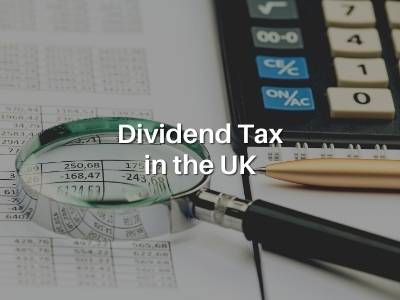Understand the United Kingdom’s Tax on Dividends and How Much Should You Pay Below

What Is a Dividend Tax?
When you buy shares from a company, you make a profit by either selling the shares when the value has appreciated or receive dividend payments from the company at the end of the year. Her Majesty’s Revenue and Customs (HRMC) dividend allowance have stated that one can obtain a particular dividend payment without paying taxes. However, if one gets a dividend exceeding that threshold, they will need to start paying dividend tax.
To Pay, or Not to Pay?
If you find yourself being confused on to pay tax on dividend or not – keep reading. Technically, you only need to pay tax on dividend income that falls outside of your dividend allowance. Also known as Personal Allowance, it refers to the income you earn and keep without paying tax. How much tax on dividends you need to pay depends on your Income Tax Band; the standard amount of Personal Allowance is £12 500.
Nevertheless, if you have claims on Marriage Allowance or Blind’s Person Allowance, then you may be allowed to have a bigger amount of Personal Allowance. Do keep in mind that if your income is over £100 000, your Personal Allowance may be smaller. You also do not have to pay taxes on Individual Saving Accounts (ISAs).
The tax band and their tax rate on dividends over the allowance are as follows:
- Basic rate taxpayers must pay 7.5%
- Higher rate taxpayers must pay 32.5%
- Additional rate taxpayers must pay 38.1%
As for those who are self-employed (or other gains from other types of incomes), they must complete Self-Assessment or Form SA100 and submit it to the HRMC, where they need to include and declare their dividends.
Calculating Your Taxes
Calculating taxes, including dividend tax, is a reasonably straightforward process. All you have to do is add your incomes, such as work earnings, pensions, property profits, savings income, and, finally, your income. Your capital gains (if any) need to be accounted for after your income tax. Dividends are taxed higher than your income, which has the potential to affect the overall tax you pay. You can reduce your overall tax bill, given how the dividend is usually lower than your income. Tax years are calculated from 6th April to the following year’s 5th April. Therefore, as for the 2020 to 2021 tax year, one who earns £2000 from their dividends, they will not have to pay any tax – this is on top of a £12500 personal income. This is known as the tax-free dividend allowance.
Pay Your Taxes, Pay Them on Time
If you are not too sure on how to calculate your tax on dividend, you can always reach out to an accounting firm to help you sort out your taxes and to pay them on time.

